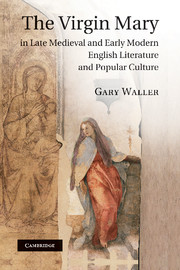Book contents
- Frontmatter
- Contents
- Preface
- I 1538 and after: the Virgin Mary in the century of iconoclasm
- THE VIRGIN MARY IN LATE MEDIEVAL CULTURE TO 1538
- FADES, TRACES: TRANSFORMATIONS OF THE VIRGIN IN EARLY MODERN ENGLAND
- 5 Fades: Elizabethan ruins, tunes, ballads, poems
- 6 Traces: English Petrarchism and the veneration of the Virgin
- 7 Traces: Shakespeare and the Virgin – All's Well That Ends Well, Pericles, and The Winter's Tale
- 8 Multiple Madonnas: traces and transformations in the seventeenth century
- Works cited
- Index
7 - Traces: Shakespeare and the Virgin – All's Well That Ends Well, Pericles, and The Winter's Tale
Published online by Cambridge University Press: 04 February 2011
- Frontmatter
- Contents
- Preface
- I 1538 and after: the Virgin Mary in the century of iconoclasm
- THE VIRGIN MARY IN LATE MEDIEVAL CULTURE TO 1538
- FADES, TRACES: TRANSFORMATIONS OF THE VIRGIN IN EARLY MODERN ENGLAND
- 5 Fades: Elizabethan ruins, tunes, ballads, poems
- 6 Traces: English Petrarchism and the veneration of the Virgin
- 7 Traces: Shakespeare and the Virgin – All's Well That Ends Well, Pericles, and The Winter's Tale
- 8 Multiple Madonnas: traces and transformations in the seventeenth century
- Works cited
- Index
Summary
Medieval drama was, as I suggested in Chapter 3, the major popular cultural form in which the contradictions of the late medieval religious world concerning the Virgin were played out, despite the best intentions of a tightly controlled civic and ecclesiastical theatrical environment. As the Reformation in England ebbed and flowed, the Protestant authorities seized upon the inherited cultural forms for their own propagandist purposes, but whereas a Protestant poetic was able to be created, using the more obviously poetical books of the Bible, especially the Psalms, as the model, in the drama no easy compromise proved possible. As Collinson notes, “the religious drama and pageantry treated divine things with a homely familiarity that was shocking and obnoxious to Protestants who had recovered their sense of God's awe-inspiring otherness.” From the late 1540s, as the Protestant revolution went forward in England, the drama went through a major transition. Protestant theologians attacked what they saw as the excesses of both biblical and non-biblical subjects on the stage, including the non-scriptural stories of the Virgin's life and powers. The official view of the older religious drama is epitomized by Dean Matthew Hutton of York's 1567 decree that a proposed “creed play” went against the “the sinceritie of the gospell,” acknowledging that “it was plausible” some years ago, and “would now also all of the ignorant sort be well liked, yet now in the happie time of the gospell,” neither the “learned” nor the “state” would likely tolerate it.
- Type
- Chapter
- Information
- The Virgin Mary in Late Medieval and Early Modern English Literature and Popular Culture , pp. 157 - 180Publisher: Cambridge University PressPrint publication year: 2011



